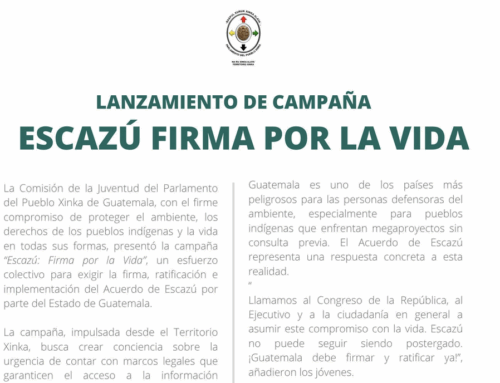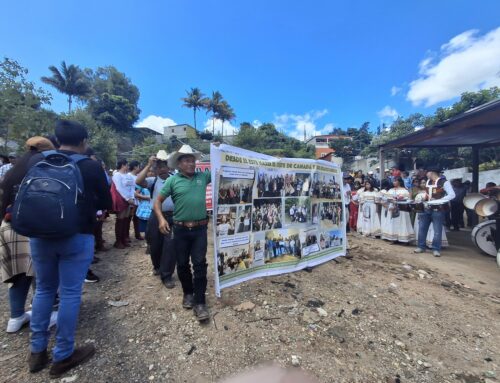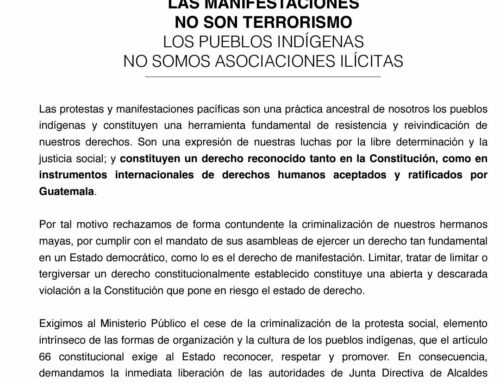Featured photo credit: CALAS
With files from the Maritimes-Guatemala Breaking the Silence Network.
On June 1, Guatemala trial Judge Verónica Ruíz convicted six members of the National Civil Police for breach of duty. All six officers were responsible for the custody of Alberto Rotondo Dall’orso, former head of security for Tahoe Resources’ Escobal mine, who was under house arrest in his apartment in Guatemala City and went missing in late November 2015.
Rotondo was initially arrested in April 2013 in Guatemala City’s Aurora International Airport, attempting to flee the country days after he ordered private security to open fire on farmers peacefully protesting outside the mine site. For more on the trial, click here.
Despite posing a serious and obvious flight risk, Rotondo was granted house arrest while he awaited trial on criminal charges of causing serious and minor bodily harm and obstruction of justice. After numerous appeals by the public prosecutor and co-plaintiff, his house arrest was eventually overturned. He was found missing as the decision to transfer him to pre-trail detention was being processed. Since then, he has been found in his home country of Peru where he remains under police custody, awaiting an extradition order.
All six officers were found guilty of breach of duty and sentenced to three years in prison each; four of the six were also sentenced to an additional three years for culpable negligence that allowed for Rotondo’s escape.
The two-day trial included witness testimonies that gave a fuller picture to the tight control that Rotondo held over his own house arrest. Four of the six accused police officers gave their declarations, arguing that they trusted reports by the officer on duty before them that Rotondo was home, but admitted to not reporting the fact that they were denied entry into the building and that they had not seen Rotondo during their shift. The first witness, a caretaker for Rotondo’s building, testified that Rotondo’s complaints to the owner prevented the police from entering his apartment to verify his whereabouts.
One of the inspectors in charge of the Zone 10 police substation where the six convicted officers had to submit their custody reports, testified to having told the officers on numerous occasions to take their posts more seriously and to stop using personal vehicles to transport Rotondo. The other inspector testified to the important role that officers play when taking someone into custody and described the normal reporting procedure that they should have followed to prevent his escape.
The witnesses for the prosecution ended with the testimony of Alberto Choc Caal, a security guard at a car dealership located across the road from Rotondo’s building. Choc Caal testified to having seen Rotondo leave his house on multiple occasions without police supervision. The last time he saw him – presumably on November 24 – Rotondo got into a grey truck around 2 P.M, driven by an elderly grey-haired man that Mr. Choc recognized as a regular visitor. The police agents were not present when Rotondo escaped, but returned later that day and were told by Choc Caal that Rotondo had left. The police only filed a motion for habeas corpus on November 28 – four days after Rotondo had allegedly escaped.
Judge Ruíz accepted into evidence reports presented by the Special Prosecutor’s Office on Attacks Against Human Rights Defenders, including one report detailing Rotondo’s escape by land into Mexico on November 25, 2015. By not immediately reporting the escape, the on-duty agents allowed Rotondo the 19-hour leeway he needed to leave the country without fear of arrest.
During his opening and closing remarks, Rafael Maldonado – a lawyer with the Center for Environmental and Legal Action (CALAS) and representative of Yuri Melini, a plaintiff in the case – pointed to the presence in the courtroom of four of the men who had been shot by private security outside the Escobal mine on orders given by Rotondo. Maldonado emphasized that in allowing Rotondo to escape, the survivors had been denied an important opportunity for justice for the physical and psychological violence they experienced.
The full verdict is expected to be read later today.






Leave A Comment